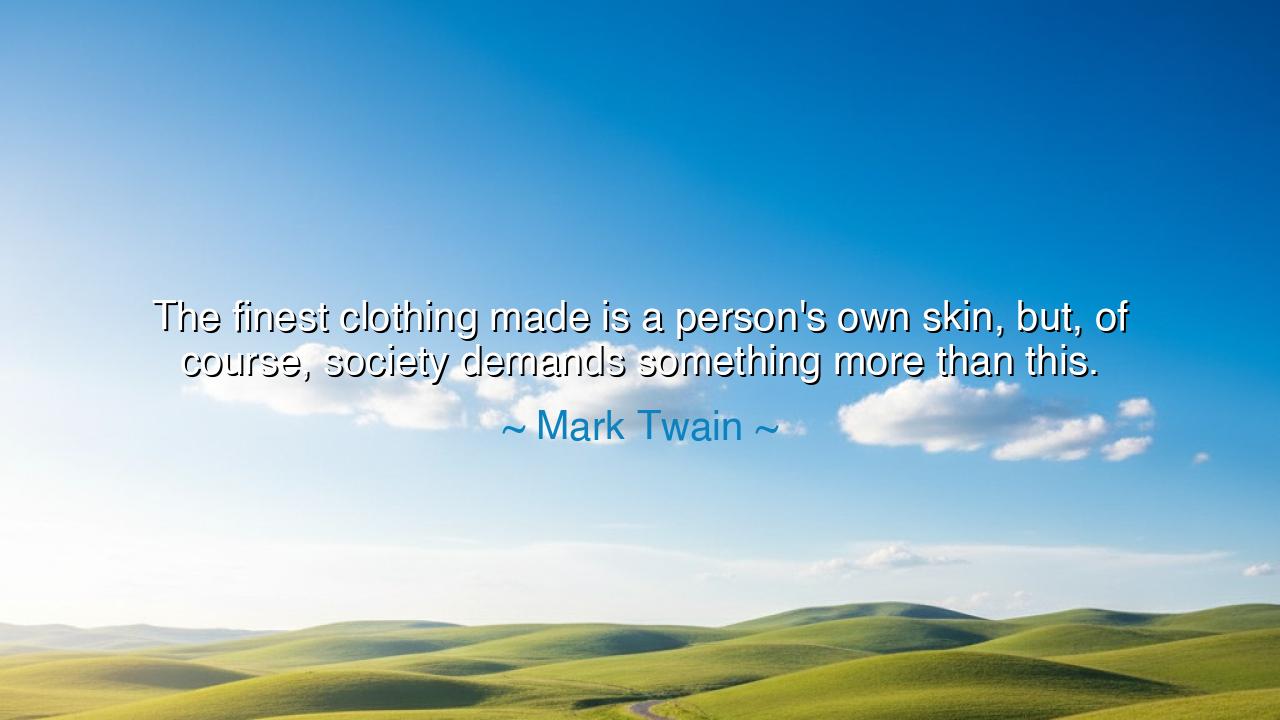
The finest clothing made is a person's own skin, but, of course
The finest clothing made is a person's own skin, but, of course, society demands something more than this.






The ever-watchful satirist of human folly, Mark Twain, once remarked with his trademark wit: “The finest clothing made is a person's own skin, but, of course, society demands something more than this.” In these words lies both humor and wisdom. Twain strips away the pretenses of civilization to remind us that before silks, before jewels, before robes of power, man’s truest garment is his own body—crafted by nature, unadorned, and sufficient. Yet society, ever hungry for masks and symbols, insists that we wrap ourselves in fabric, fashion, and artifice, as if to hide the simple truth of who we are.
To say that skin is the finest clothing is to honor the human being in their most natural state, without ornament or disguise. The body itself—its strength, its form, its scars—is the purest expression of existence. It is honest, unpretending, a garment not chosen but bestowed by life. Yet, Twain adds with a wry smile, society demands more: it demands costumes, uniforms, suits of armor, and garments that signal wealth, status, modesty, or respectability. Thus, what is natural becomes insufficient, and what is artificial becomes the measure by which men are judged.
History gives us endless examples of this truth. In the courts of Versailles under Louis XIV, clothing became a weapon of hierarchy. Nobles bankrupted themselves to keep up with the elaborate demands of fashion, while peasants starved in rags. The body itself was forgotten, hidden beneath brocade and lace. It was not a man’s heart or deeds that determined his worth in that society, but the cost of the garments upon his back. Twain’s words would have struck those courtiers like lightning, reminding them that all their finery could never outshine the simple dignity of human skin.
So too in more recent times we find the same pattern. Consider Mahatma Gandhi, who chose to clothe himself only in the humble homespun cloth of his people. Against the British Empire, which draped itself in uniforms and crowns, Gandhi’s simple garment spoke louder than any jeweled robe. He showed that the body clothed in simplicity, when aligned with truth, is more powerful than the body adorned in extravagance. In his life, we see Twain’s observation inverted: society demanded more, but the wisest man gave less—and in doing so, revealed more of his true self.
The meaning of Twain’s words is therefore both comical and profound: society’s demands for clothing are not merely about warmth or modesty, but about conformity. Clothing becomes a mask, a signal to others, a way of saying, “I belong,” or “I am above you.” The skin, however, cannot lie. It tells of age, of labor, of experience. It is the garment of truth, while society’s demands often lead us to wear garments of falsehood. Twain, in his genius, forces us to laugh at the absurdity of it, while also asking us to ponder: how often do we hide ourselves, even from ourselves, in layers of fabric and pretense?
The lesson for us is clear: do not let the garments of society define your worth. Clothes may impress, but they cannot create dignity. That comes from the life lived beneath the skin. Honor your body as your truest clothing, and let the garments you choose be a servant of function, not a master of your identity. Beware of judging others by what they wear, for the finest clothing was given at birth and cannot be bought or sold.
Practical wisdom flows: dress as you must for work, for duty, for the customs of your land, but do not let those garments deceive you into forgetting who you are beneath them. Take pride not in the cloth upon your back, but in the strength of your spirit, the honesty of your deeds, and the character that shines through your skin. And when society demands “something more,” give it no more than is necessary—never the surrender of your soul.
So let Twain’s words echo with both laughter and truth: “The finest clothing made is a person's own skin, but, of course, society demands something more than this.” Let them remind you to strip away the false layers of vanity and pride, and to live clothed in integrity. For in the end, when all garments fade, what remains is the skin—and within it, the soul—that no society can cover or demand away.






AAdministratorAdministrator
Welcome, honored guests. Please leave a comment, we will respond soon